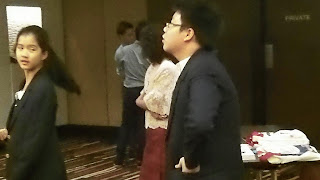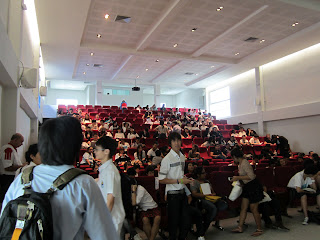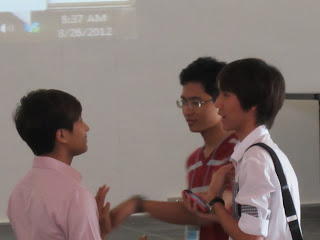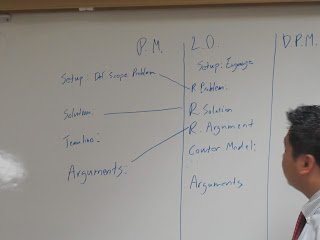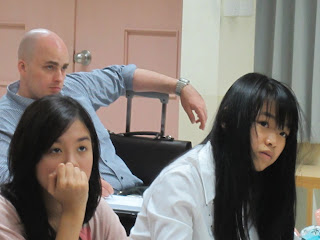This site is a resource for people to learn about debate. It will include World Schools style, All-Asians, National Foresenic League USA, and British Parliamentary style including adjudicating and debating plus coaching. FOR DEBATE COACHING please contact gsakuma@live.com
Debate Judging and Debating $14.99
for USD $14.99, Debate Judging and Debating Handbook will show you how to teach debate, debate, and judge it. It's all you need to know to become a better debater, judge, and teacher. By Mr. Gary, 2010 World Schools Adjudicator for Thailand at Scotland and 2017 Bali, a certified science teacher, he's been assisting the National Team for Thailand--2008-2011, 2013-present.
Wednesday, December 26, 2012
Monday, December 24, 2012
Sunday, December 23, 2012
Thursday, December 20, 2012
Wednesday, December 12, 2012
Saturday, December 8, 2012
Video Short Course: Elements of Debate
This video goes over the speaker roles, how to make an argument, and the strategies necessary to start your team. Using techniques and methods seen at the World Schools Debate Championships along with National Team Training for Thailand. This course is a great introduction to the ways to debate All-Asians or World Schools style.
1000 THB plus 7% tax
Order today to gain the advantage
-->
Thursday, November 29, 2012
MUIC Debate Seminar
The Muic Seminar presented by the Head Coach of the Thailand National Team and recent Finalist at the BP Championships in Hong Kong: CHAINARONG SANGSRANOI
Sunday, October 21, 2012
EUTHAILAND 2012: abac 1 vs muic pm
How to Play Singles: The Ebook for $19.99everything you ever wanted to know about playing tennis and strategies
Wednesday, October 17, 2012
EUDC 2009 Newcastle SEMI FINAL_6 SpeakerOxford A
How to Play Singles: The Ebook for $19.99everything you ever wanted to know about playing tennis and strategies
to be better in debate--read the economist...
Debate is a combination of skills--but the most important is a general understanding of what is going on in the world along with an ability to organize your thoughts. The economist has great facts from a fairly neutral view point. Reading it gives you an accurate perspective on global issues. Also, their editorials present a viewpoint which you can breakdown. To be better in debate, you have to do different things.
The war in Syria
Death from the skies
The growing horror of the Syrian civil war has put military intervention back on the agenda
Sep 15th 2012 | IDLEB PROVINCE AND LONDON | from the print edition
THE rebel fighters, lolling sleepily in a former police station, are suddenly interrupted by a rocket that crashes into the roof over an unoccupied room. Although the Syrian regime has ceded direct control over this and much of the rest of Idleb, a rural province in the north-west, shelling and other attacks from a distance are a frequent annoyance—and worse. As night falls, behind closed doors, a woman sits guessing which village the distant thud of falling shells is coming from tonight. Her children, meanwhile, are busy describing in detail how the mother of a friend had her limbs torn off by a rocket.
For all their risks, such villages look like positive havens to the Syrians fleeing Aleppo, the country’s second city and now its primary battleground. The government and the rebels have been trading turf back and forth along the front line since the grinding battle started in July. One day the rebels take an army barracks; the next the regime claims to have grabbed it back. Meanwhile, in the suburbs around Damascus, corpses of young men with their hands tied behind their backs are piling up. Shelling continues from Deir ez-Zor in the east to the southern plains of Deraa, as do air raids. Fighting rages in every province.
As the civilian death toll rises, the question of whether other countries should intervene with armed force is becoming acute. Opposition groups estimate that August was by far the bloodiest month since the uprising began in March last year, accounting for a fifth of the estimated 25,000 to have died so far (see chart). Michael Clarke, the director of the Royal United Services Institute, a think-tank in London, believes that the preference Europe and America have shown for staying out of the conflict, at least in terms of military action, is being worn down by both the scale of the suffering and the threat it now poses to the stability of fragile neighbouring countries. “We are not moving towards intervention,” he says. “But intervention is certainly moving towards us.”
There are several reasons for the escalation of brutality over the summer. Opposition fighters in the Free Syrian Army were over-confident in attempting to hold parts of Damascus and Aleppo before they had the means of doing so; counter-attacks concentrated the violence in places where there were lots of civilians to get hurt. And the regime of Bashar Assad appears to have discarded any form of restraint. That is partly because of its own increasing desperation, but also because in the past it was not sure how far the international community would let it go. Now it has crossed more or less all the “red lines” that Western politicians had hoped it would respect. The use of chemical weapons seems the only thing that would be certain to trigger a military response from outside.
The clearest indication that Syria no longer cares about calibrating its use of violence has been the growing use of air power, first with helicopter gunships, then with fighter jets. The air campaign allows the regime to terrorise and punish areas where it has lost control and to conserve its ground forces, especially its tanks, which have become more vulnerable as the rebels have grown in experience.
Aerial attacks also have the advantage of depending on a part of the armed forces which is almost entirely controlled by Alawites, the sect to which the Assad family adheres. Mr Assad’s father, Hafez, ran the air force before he launched the coup that brought him to power in 1970. It is reasonably well equipped, with perhaps 325 aeroplanes that can be used for ground attack and 33 helicopter gunships, and its personnel are thought less prone to defection than army officers have proved.
The legal questions
If nothing happens to limit Mr Assad’s deployment of air power, the rebels will struggle to make further gains and may themselves become more savage in their frustration. The civilian death toll will continue to mount. The flow of refugees into neighbouring countries—4,000 a day are trying to cross into Turkey—will grow.
But what limits on the regime’s violence might the West and the uprising’s Sunni Arab supporters, such as Saudi Arabia, the United Arab Emirates and Qatar, impose—and to what purpose? The options include providing the rebels with more anti-aircraft weapons; establishing a humanitarian corridor from north of Aleppo to the border with Turkey under the protection of outside forces, a call made by France’s president, François Hollande, and Turkey’s foreign minister, Ahmet Davutoglu, in the first week of September; enforcing a no-fly zone over the entire country; and actively seeking to end the regime. Each of these options looks likely to have unwanted consequences, and they are anyway all likely to merge into each other.
They are also probably illegal. The 1945 UN charter prohibits all use of force against other countries, unless in legitimate self-defence or with authorisation by the UN Security Council. The doctrine of the responsibility to protect (R2P), allowing states to intervene to protect civilians from atrocities where their own government is failing to do so, does not create a new exception to this rule. The Security Council must give its approval.
Some argue that in an international emergency, when the Security Council is blocked by the veto, or threat of veto, of one of its permanent members (as now, by Russia and China), the General Assembly can bypass the Security Council and authorise the use of force itself. This first happened in 1950 at the height of the Korean war, when Russia was blocking international intervention. But this ruse, if ever legitimate, has now fallen into disrepute.
NATO’s action in Kosovo at the end of the 1990s is often cited as an example of compelling political and moral considerations leaving no choice but to act outside international law. But the whole universal system of collective security could be undermined if it were invoked so soon again, particularly after the highly questionable invasion of Iraq in 2003—and would leave those involved liable to prosecution for war crimes before the International Criminal Court in The Hague.
In the absence of a Security Council resolution, America would at a minimum require an active coalition of the willing that included the endorsement of NATO and the Arab League. There would have to be a political end beyond reducing the regime’s capacity for violence against its own people—but what that might be remains far from clear.
Perhaps the most superficially appealing choice would be to establish a limited no-fly zone around a protected area, an idea that was briefly discussed as a possibility in Libya. NATO, if it agreed to be the guarantor of such a safe zone, would declare that any attack would be met with a vigorous response. The hope would be that its bluff would not be called. But a single safe haven might have little effect in a conflict now so widely dispersed; if one were guaranteed there would soon be calls for others. General Martin Dempsey, the chairman of America’s joint chiefs of staff, says that the establishment of a humanitarian zone would mean an obligation to protect it not only from Syrian aircraft but also from missile attack and artillery, requiring the option of attacks on ground forces as well as aircraft.
Going in
To threaten force means being ready to follow through, which would be a big commitment. General Dempsey stresses that any comparison between the no-fly zone established in Libya last year and the forcible imposition of something similar in Syria is spurious. He says that Syria’s integrated air-defence system is many times more capable than Libya’s while covering a smaller area, making it a much more challenging obstacle.
Unlike the air defences of Serbia, which NATO took on with relative ease during the 1999 Kosovo campaign, Syria’s are designed to deal with a sophisticated adversary—Israel. The Syrian regime has spent billions trying to get them up to scratch. They include modern Russian systems, which Western experts expect to be highly capable. There is the SA-22 Greyhound, a mobile system with both surface-to-air (SAM) missiles and anti-aircraft guns, the SA-17 Grizzly, a medium-range missile capable of handling many different targets simultaneously, and the long-range SA-5 Gammon, which poses a threat to command-and-control aircraft and aerial tankers. Syria also has about 4,000 rockets, which, like American Stingers, can be carried around without vehicles and hoisted onto a shoulder for use: “man-portable air-defence systems”, or MANPADS.
Such forces are not insurmountable; as General Dempsey says without braggadocio, his forces “can do just about anything”. But unlike the intervention in Libya, where France and Britain took point and America “led from behind”, an intervention in Syria would have to be a mostly American affair, and as such it would be done with massive force from the outset. Douglas Barrie, an air-power expert at the International Institute for Strategic Studies in London, says America would insist on quickly destroying Syria’s air defences to reduce the risk to its forces as far as possible.
General Dempsey claims that no contingency planning for such a campaign has been ordered beyond what he calls “the commander’s-estimate level of detail”. A sense of what it might require, though, comes from a detailed open-source analysis by Brian Haggerty of MIT’s Security Studies Programme, which looked at a campaign to suppress Syrian air defences and establish safe zones in the north-west of the country.
Mr Haggerty reckons this would require (for openers) striking around 450 targets, including more than 20 command, control and early-warning radar centres, 150 SAM sites, 205 aircraft shelters, 32 additional air-base targets, 27 surface-to-surface (SS) missile batteries and 12 anti-ship cruise-missile batteries. As Mr Barrie points out, such a long list means a lot of work to identify and find targets. Western special forces are probably already on the ground in Syria compiling such a list, as well as identifying where Syria’s many chemical- and biological-weapons production and storage sites are.
Mr Clarke says that some harm may already have been done to Syria’s air-defence systems by Western cyber-attacks. Syria is more vulnerable than Libya was to such tactics, because of its greater reliance on computers for integration and control. It has been reported that when the Israeli air force attacked a nuclear site in Syria in 2007 it used such tricks to crash the country’s air defences at the right moment, but such claims should be treated with some scepticism. The Israelis would probably like the world to believe that they have dark cyber arts at their disposal, rather than that they simply caught the Syrians napping.
Readying an F-15
Mr Haggerty calculates that the opening phase of the campaign would require nearly 200 strike aircraft and over 100 support aircraft—several times the number used in the opening phase of the action in Libya. On top of the sorties by strike aircraft, there would also be a lot more sorties by heavy bombers than Libya saw, and a lot more cruise-missile salvoes. (The strike aircraft would probably not include America’s latest stealth fighter, the F-22, which despite its costly radar-proofing is not well suited to such attacks.) Mr Haggerty thinks 600-700 cruise missiles might be necessary, compared with 221 used against Libya in 2011 and 802 used in the 2003 invasion of Iraq. Thereafter, round-the-clock fighter sorties would have to be flown in a hunt for Syria’s mobile missile launchers (which would be visible only when they turned their radars on, or were spotted by special forces on the ground) and to deter what was left of its air force from flying. Any attempt by the regime to bring its long-range artillery near the safe zones would also have to be stopped.
In terms of logistics, cruise missiles could be launched from American submarines in the Mediterranean and possibly from ships in the Gulf, although the shipswould be at the limit of their range. More probably, a second carrier battle group would have to join the US Sixth Fleet in the Mediterranean. But if the carrier group was one of the two now patrolling in or near the Gulf with the Fifth Fleet, that would diminish America’s ability to deter an aggressive response from Iran if Israel were to attack its nuclear facilities. The need for such deterrence is a strategic concern which outweighs Syria in Washington’s estimation, at least for the time being.
Other strike fighters and support aircraft could fly from Incirlik, a NATO airbase in southern Turkey, and from the British base at Akrotiri in Cyprus. Both bases would be within range of Syrian Scud-B missiles. However, if Syria were to start using its Scud arsenal, the campaign to destroy its air defences would rapidly switch to one of explicit regime change.
The other option
America and its allies could do all this if the order were given—but not without committing substantial resources and accepting some losses. It is also inevitable that many more civilians would be killed by American and Western bombs than in Libya, where 72 were admitted to have been killed by NATO air strikes. Many air-defence installations, especially around Damascus, are ringed by buildings in which civilians live and work. As well as killing Syrian civilians, the attacks would probably also hit Russian, Chinese and Iranian technical advisers, causing yet more diplomatic trouble.
Where Muammar Qaddafi’s army was a hollowed-out shell dependent on foreign mercenaries, the Assad regime’s ground forces remain for the most part well-equipped and deployable. How their morale would survive an attack on the air-defence system and air force is not clear; but it is possible that those who want to defect have already done so, and those who remain are committed, come what may.
Mr Haggerty is clear that imposing a no-fly zone would eventually mean attacking other parts of the armed forces. “The idea that this could be kept limited to a defensive operation is wishful thinking,” he says. “You would quickly become the air force for one side in a civil war with the objective of regime change.” Without coherent leadership in the rebel forces, such a war could be a bloody mess, and the West would be tarred by association with the more feral militias. The fact that the destruction of Syria’s air power would be a boon to Israel would also add to suspicions about Western motives.
Given the difficulties, it is tempting to conclude, as Mr Barrie does, that the least-bad option may still, just, be to do nothing. On the other hand, can the West continue to stand aside when civilians are being killed at an accelerating rate and a strategically vital region is threatened with meltdown? There really are no easy choices.
Tuesday, October 9, 2012
EU-Thailand--debate league organizing
I will be in Khon Kaen signing people up for the League, so if you're interested but are not going to Khon Kaen drop me a line. gary@panyarathighschool.ac.th
Wednesday, October 3, 2012
Rankings based on TWSDC for 2012
Ranking Name School
1 Pimvipa Kunanusorn PDS
2 Akarachai Chaimaneekarakate Anglo
3 Binam Acharya Anglo
4 Thitaree Lapanaphan Anglo
5 Thawan Gunawan Anglo
6 Natthicha Wiriyatornphan TU
7 Charmaine Chin Anglo
8 Janina Wasserhaas Anglo
9 Jasandra Sutanto Anglo
10 Natthanun Thanomvajamun TU
11 Nattanicha Payne SHC
12 Kasidej AC
13 Methin Paspanthong TU
14 Sirawit Hiranniramol TU
15 Suprachote Kongketyai AC
16 Nithiya Phumejitpakdee SHC
17 Ramitra Sriwasumetharatsami SHC
18 Chidchanog Chidchanognarth TU
19 Akhil Shanishetti Wells
20 Jebelle Sutanto Anglo
21 Sangnapa Sriweerawanidchakun Anglo
22 Wan Thabkrajang SHC
23 Navarerk Kaewphakdee ACT
24 Warittha Phetklueng TU
25 Punyanuch Bodinpukdeekul TU
26 Prakasit Banluesin AC
27 Saranchana Ramyananda TU
28 Visarut Limsowan AC
29 Pornphan Uasunthonphanit Anglo
30 Pee Asawachinda TU
31 Vasin Sukontanon ACT
32 Patipol AC
33 Bunchana Sawattananond TU
34 Phasakorn Binaree AC
35 Panisa Supatadarut TU
36 Natthapatch Ratanachaijaroen SHC
37 Sharina Navani PAIS
38 Napat Tangsongjaroen AC
39 Pattanan Kammarapat PHS
40 Piyawat Sungsilpachai TU
41 Chonnakant Lertsatit TU
42 Varinthorn Suwattananon ACT
43 Yossathorn Niamsaing PHS
44 Fatima Khan PAIS
45 Nasirat Sukkasame SHC
46 Pimpatchara Komalarajun PHS
47 Fuangriddhi Masuntasuwan AC
48 Nattakarn Ratanachaijaroen SHC
49 Najihah Khan PAIS
50 Nichakarn Pongcharoen PHS
51 Anas Ali PAIS
52 Puttharaksa Jintavuttipong PHS
53 Passawee Somjaiwong TU
54 Chayatat Pattanaphum TU
55 Mathurin Suwanwalaikorn PHS
56 Ravin PDS
57 Sutthida Glormgeao ACT
58 Jaden / Jerome SWING 1
59 Stina Virtanen ACT
60 Oumaro Fofana PAIS
-->
1 Pimvipa Kunanusorn PDS
2 Akarachai Chaimaneekarakate Anglo
3 Binam Acharya Anglo
4 Thitaree Lapanaphan Anglo
5 Thawan Gunawan Anglo
6 Natthicha Wiriyatornphan TU
7 Charmaine Chin Anglo
8 Janina Wasserhaas Anglo
9 Jasandra Sutanto Anglo
10 Natthanun Thanomvajamun TU
11 Nattanicha Payne SHC
12 Kasidej AC
13 Methin Paspanthong TU
14 Sirawit Hiranniramol TU
15 Suprachote Kongketyai AC
16 Nithiya Phumejitpakdee SHC
17 Ramitra Sriwasumetharatsami SHC
18 Chidchanog Chidchanognarth TU
19 Akhil Shanishetti Wells
20 Jebelle Sutanto Anglo
21 Sangnapa Sriweerawanidchakun Anglo
22 Wan Thabkrajang SHC
23 Navarerk Kaewphakdee ACT
24 Warittha Phetklueng TU
25 Punyanuch Bodinpukdeekul TU
26 Prakasit Banluesin AC
27 Saranchana Ramyananda TU
28 Visarut Limsowan AC
29 Pornphan Uasunthonphanit Anglo
30 Pee Asawachinda TU
31 Vasin Sukontanon ACT
32 Patipol AC
33 Bunchana Sawattananond TU
34 Phasakorn Binaree AC
35 Panisa Supatadarut TU
36 Natthapatch Ratanachaijaroen SHC
37 Sharina Navani PAIS
38 Napat Tangsongjaroen AC
39 Pattanan Kammarapat PHS
40 Piyawat Sungsilpachai TU
41 Chonnakant Lertsatit TU
42 Varinthorn Suwattananon ACT
43 Yossathorn Niamsaing PHS
44 Fatima Khan PAIS
45 Nasirat Sukkasame SHC
46 Pimpatchara Komalarajun PHS
47 Fuangriddhi Masuntasuwan AC
48 Nattakarn Ratanachaijaroen SHC
49 Najihah Khan PAIS
50 Nichakarn Pongcharoen PHS
51 Anas Ali PAIS
52 Puttharaksa Jintavuttipong PHS
53 Passawee Somjaiwong TU
54 Chayatat Pattanaphum TU
55 Mathurin Suwanwalaikorn PHS
56 Ravin PDS
57 Sutthida Glormgeao ACT
58 Jaden / Jerome SWING 1
59 Stina Virtanen ACT
60 Oumaro Fofana PAIS
-->
Tuesday, October 2, 2012
TWSDC Finals 2012: Xavier vs Malayasia WSDC THB Corporations are not human
How to Play Singles: The Ebook for $19.99everything you ever wanted to know about playing tennis and strategies
Tuesday, September 25, 2012
Sunday, September 9, 2012
Boston University Debate Society at the Amherst College Debate Tournament
The Boston University Debate Society is currently ranked 4th in the nation, behind only Yale, Harvard, and Johns Hopkins. In this round, the Debate Society defeats a team from the University of Chicago on the topic "The Executive Order banning political assassinations should be repealed."
Saturday, September 1, 2012
Ebook on Debate
We're writing an ebook on debate and offering a pre-order discount of 200 baht. Your pre-order price is 499 baht
The book will cover debating, the format, and HOW TO COACH IT as well as how to make cases from the simple principle case converting an illegal into a legal, such as legalize gambling, to comparative cases such as economics vs environment, to value judgement cases TH regrets the effect of media on men, and entwine principle and practical motions. It will show you how to make proper rebuttals as well as how to research and make cases. There will also be instruction videos to help make you a better judge and show you the differences between World School and All Asians.
Order today for the discount--publishing date September 31, 2012 just in time for Eu -Thailand. 499 baht
Friday, August 31, 2012
Tuesday, August 28, 2012
Friday, August 24, 2012
Monday, August 20, 2012
IN Honor of South Africa==listen for the ACCENT
The opening speach at the ASDC, 2009. South Africa (Government) is debating Botswana (Opposition) in the finals of the ASDC. The motion is about the role of China and the West in African development. The debate took place at the Nelson Mandela Foundation.
IN Honor of South Africa==listen for the ACCENT
The opening speach at the ASDC, 2009. South Africa (Government) is debating Botswana (Opposition) in the finals of the ASDC. The motion is about the role of China and the West in African development. The debate took place at the Nelson Mandela Foundation.
IN Honor of South Africa==listen for the ACCENT
The opening speach at the ASDC, 2009. South Africa (Government) is debating Botswana (Opposition) in the finals of the ASDC. The motion is about the role of China and the West in African development. The debate took place at the Nelson Mandela Foundation.
Saturday, August 18, 2012
Thursday, August 16, 2012
Wednesday, August 8, 2012
Friday, August 3, 2012
US resist control of Internet slipping away
http://www.bbc.com/news/technology-19106420
US resists control of internet passing to UN agency
By Leo Kelion Technology reporter
Dr Hamadoun Toure The UN's Dr Toure says any change to governance of the internet must be supported by all countries
Continue reading the main story
Related Stories
Who should govern the internet?
UN warning on 'risk of cyberwar'
UN seeks to settle patent wars
The US has confirmed it would resist efforts to put the internet under the control of the United Nations.
At present several non-profit US bodies oversee the net's technical specifications and domain name system.
They operate at arms-length from the US government but officially under the remit of its Department of Commerce.
There has been speculation that other nations will push for a change later this year, but they cannot force the US to comply.
The US has set out its position in documents filed with the International Telecommunications Union (ITU) - the UN agency responsible for encouraging the development of communications technologies.
The ITU is hosting a conference in December in Dubai to which representatives from 178 nations have been invited to review the International Telecommunications Regulations (ITR).
The ITR is a 1988 treaty which set out rules for how traffic should flow between different telecom networks, and how to calculate charges for traffic exchanged between carriers in different countries.
The rise of the internet and mobile devices has led to calls for it to be revised, but countries are expected to disagree over the changes needed.
The US's ambassador to the conference, Terry Kramer, outlined his worries in a statement published by the country's Department of State.
"The US is concerned that proposals by some other governments could lead to greater regulatory burdens being placed on the international telecom sector, or perhaps even extended to the internet sector," he wrote.
President Vladimir Putin Russia's President supports the idea of giving the ITU greater "control" over the internet
"The United States also believes that existing multi-stakeholder institutions, incorporating industry and civil society, have functioned effectively and will continue to ensure the health and growth of the internet and all its benefits."
Leaked documents
The ITU does not publish submissions by each country - leaving it up to the individual states to decide which material to release. But a site called Wcitleaks.org has posted proposals leaked to it.
They include a submission from Russia suggesting the ITU could become responsible for allocating at least some of the internet's addresses as well as the "determination of the necessary requirements".
At present US-based Icann (Internet Corporation for Assigned Names and Numbers) co-ordinates the codes and numbering systems, deciding which new internet address endings should be allowed as an alternative to .com. It then leaves it to ISPs (internet service providers) to assign individual addresses.
President Vladimir Putin has signalled Russia's final submission could go further. In 2011 he said he was keen to discuss "establishing international control over the internet using the monitoring and supervisory capabilities of the International Telecommunication Union".
The Russia Today news service has since reported that China and India had backed this stance.
No votes
But the ITU has made it clear that any changes to the treaty must have unanimous support, and it would block members trying to put any matter to a vote.
"We never vote because voting means winners and losers and you can't afford that," Dr Hamadoun Toure, the ITU's secretary-general told the BBC.
Dubai skyline The ITU conference will take place in Dubai from 3 to 12 December
"Whatever one single country does not accept will not pass."
He acknowledged that some countries were unhappy with the way Icann had looked after the internet address system.
"Some people are saying the governments are not consulted enough," he said.
But he played down the idea that there would be a serious effort to seize control of its functions and pass them to the ITU.
"Has anybody suggested to take responsibility from Icann? No, it's never been done. I truly believe there is a complementarity involved between our work - we can work together
Thursday, August 2, 2012
Monday, July 30, 2012
WSDC 2007 Round 1, Korea vs. Canada (part 1)
key terms in this debate--developmental aid and how it should be freely given but monitored
Sunday, July 29, 2012
Thursday, July 26, 2012
Wednesday, July 25, 2012
Friday, July 20, 2012
Monday, July 16, 2012
Friday, July 13, 2012
Monday, July 9, 2012
Saturday, July 7, 2012
Tuesday, July 3, 2012
Monday, July 2, 2012
Subscribe to:
Posts (Atom)
For US$29.99 How to Play SIngles
Hawaii Tennis Pro presents
SIMPLE TENNIS
his tennis strategies in
Singles in an easy to understand
Ebook for only $29.99 plus 7% tax.
130 pages and counting. one year of free updates plus video links with simple explanations.
it will be sent via email to you and when we update it, we update your copy for one year.
Nearly every page has clear diagrams and pictures to help with your understanding. Difficult topics have a video link for added understanding. Hawaii Tennis Pro Tennis for everyone. Covers mental toughness, match preparation, practice techniques to work on the shot and shot selections
Nearly every page has clear diagrams and pictures to help with your understanding. Difficult topics have a video link for added understanding. Hawaii Tennis Pro Tennis for everyone. Covers mental toughness, match preparation, practice techniques to work on the shot and shot selections











